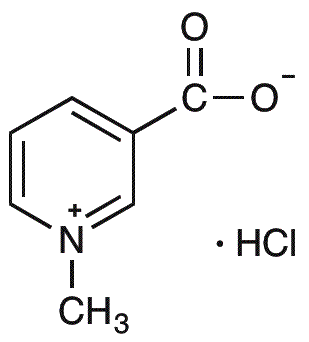Trigonelline hydrochloride is widely utilized in research focused on:
- Pharmaceutical Development: This compound is often explored for its potential therapeutic effects, particularly in managing diabetes and metabolic disorders. Researchers are investigating its role in enhancing insulin sensitivity.
- Food Industry: Trigonelline is found in coffee and is studied for its antioxidant properties. It can be used as a natural preservative, helping to extend the shelf life of food products while maintaining flavor and quality.
- Cosmetics: The compound is being incorporated into skincare products for its moisturizing and skin-soothing properties. It can help improve skin texture and hydration, making it valuable in cosmetic formulations.
- Biotechnology: In plant research, trigonelline is examined for its role in plant stress responses. It can enhance plant resilience to environmental stressors, making it relevant for agricultural applications.
- Neuroscience: Studies are exploring its neuroprotective effects, with potential applications in treating neurodegenerative diseases. This could lead to innovative treatments for conditions like Alzheimer's and Parkinson's disease.
General Information
Properties
Safety and Regulations
Applications
Trigonelline hydrochloride is widely utilized in research focused on:
- Pharmaceutical Development: This compound is often explored for its potential therapeutic effects, particularly in managing diabetes and metabolic disorders. Researchers are investigating its role in enhancing insulin sensitivity.
- Food Industry: Trigonelline is found in coffee and is studied for its antioxidant properties. It can be used as a natural preservative, helping to extend the shelf life of food products while maintaining flavor and quality.
- Cosmetics: The compound is being incorporated into skincare products for its moisturizing and skin-soothing properties. It can help improve skin texture and hydration, making it valuable in cosmetic formulations.
- Biotechnology: In plant research, trigonelline is examined for its role in plant stress responses. It can enhance plant resilience to environmental stressors, making it relevant for agricultural applications.
- Neuroscience: Studies are exploring its neuroprotective effects, with potential applications in treating neurodegenerative diseases. This could lead to innovative treatments for conditions like Alzheimer's and Parkinson's disease.
Documents
Safety Data Sheets (SDS)
The SDS provides comprehensive safety information on handling, storage, and disposal of the product.
Product Specification (PS)
The PS provides a comprehensive breakdown of the product’s properties, including chemical composition, physical state, purity, and storage requirements. It also details acceptable quality ranges and the product's intended applications.
Certificates of Analysis (COA)
Search for Certificates of Analysis (COA) by entering the products Lot Number. Lot and Batch Numbers can be found on a product’s label following the words ‘Lot’ or ‘Batch’.
Numéro de catalogue
Numéro de lot/série
Certificates Of Origin (COO)
This COO confirms the country where the product was manufactured, and also details the materials and components used in it and whether it is derived from natural, synthetic, or other specific sources. This certificate may be required for customs, trade, and regulatory compliance.
Numéro de catalogue
Numéro de lot/série
Safety Data Sheets (SDS)
The SDS provides comprehensive safety information on handling, storage, and disposal of the product.
DownloadProduct Specification (PS)
The PS provides a comprehensive breakdown of the product’s properties, including chemical composition, physical state, purity, and storage requirements. It also details acceptable quality ranges and the product's intended applications.
DownloadCertificates of Analysis (COA)
Search for Certificates of Analysis (COA) by entering the products Lot Number. Lot and Batch Numbers can be found on a product’s label following the words ‘Lot’ or ‘Batch’.
Numéro de catalogue
Numéro de lot/série
Certificates Of Origin (COO)
This COO confirms the country where the product was manufactured, and also details the materials and components used in it and whether it is derived from natural, synthetic, or other specific sources. This certificate may be required for customs, trade, and regulatory compliance.


